#maybe you think beating the abuser up or directly confronting them is the best option
Explore tagged Tumblr posts
Text
I've rambled about this game before in tags and while I have a lot of complex thoughts on Curly as a character and what he should have done and how fandom responses and discussions have had good and bad takes (and it's all complicated and has layers which is a core point of the game!) one take I've never seen explicitly said for "Curly should have xyz" which I'm surprised to not see is "Curly should have asked Anya what she wanted". We don't know how much he would have listened or if her plan would make sense, but I think it says a lot about how the game's POVs (and some of the fandom) show Anya with little agency and someone who things happen to not someone who does things, and the men on board as the ones who make decisions and decide the course of the narrative for better or worse. I've seen people saying Anya should have been able to get angry and kill Jimmy, and people saying not all victims want violence and it's okay if she just wants to escape and move on. There's also arguments saying Curly should have reported Jimmy, shot him, put him in cryostasis, etc. and arguments saying Curly wasn't being malicious and that he was worried about things like their pay being docked, being locked with that conflict for months, not understanding the situation, etc. And it is complicated! But part of that male-centric view the game critiques (and fandom is against but accidentally perpetuates at times) is saying that it should have been Curly's choice at all. We don't know if Anya would have wanted to have shift scheduling and where she stayed and who spoke to Jimmy changed so he's kept away from her and to leave it at that. We don't know if she would have wanted to report him directly to the company's HR. We only see her when she's at her breaking point and even then her goal is to defend herself and prevent Jimmy from harming anyone. Anything past that is speculation. Obviously certain plans like a murder suicide or something like that would make sense for Curly to be against, but he never bothered to check. He said he would do anything, but didn't ask what that "anything" should be. Not all victims are the same, and not everybody has the same priorities. Part of getting rid of that male-centric toxic rape culture is letting women and victims have their own voices and decide their own paths, and framing the ideal situation as "the man in charge should have decided to protect the woman in xyz way because that's what she needed" instead of "the man in charge should have asked the woman what she needed and protected her that way" is still ultimately one man having control of everything. And we know from the game that doesn't work, even if he's a "good man that means well" and thinks he's inferring what's best. The only way to make sure victims get the support they need is to ask
#mouthwashing#curly mouthwashing#anya mouthwashing#i have a lot more complex thoughts but i'm a bit sad i haven't seen this take at all#and this also applies to real life! people know what their abuser is like better than you do#if you know somebody in a dangerous situation#talk to them!#maybe you think beating the abuser up or directly confronting them is the best option#and maybe it is but maybe that will only make them take out all that stress on your friend#some people want retaliation some want assistance some just want to vent#the first step to doing the best thing you can do for victims is to ask them what they want
82 notes
·
View notes
Text
Facing Our Making Part 4: Makeup and Performance
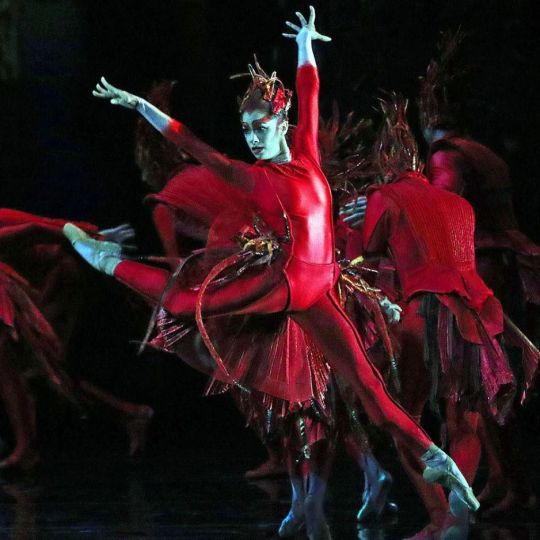
Misty Copeland as “Firebird”
Welcome to the grand finale of the makeup blog series! It’s been a great experience writing about all of this because it’s given me an incredible opportunity to really dig into myself to discover my own biases, blind spots, preferences, and ways I can learn and grow. I dunno about you, but I rather enjoy that shit. I hope that maybe you learned something, too, or at least had a chance to tease out and reflect on how the subject has affected you in your own life.
Getting into social customs and how we each feel about them is an interesting sport. For me, I liken it to when you get your blood pressure measured at the doctor’s office.
You put the arm cuff on,
“Okay, here’s this social topic”
and they put the stethoscope on you to hear your pulse,
“Hello, world. Here’s what I think…”
and then they start pumping and tightening the cuff.
“This is wrong! Here are some arbitrary rules! Less of those people! Restrict! Cancel! Humiliate! Isolate! Deprive! No! Wrong wrong wrong wrong wrong!”
They go until they can’t tighten anymore, and pause.
“Yes, I’ve arrived. This is the TRUTH.”
And then release.
“Actually, fuck it, let people live their lives”
Whooooooosh!
Leaving you with the sound and feel of your own beating heart, the pulsing of the blood as it rushes back in.
“Hello, life.”

(Sorry, I think the sexy blood pressure pout is goddamn hilarious. )
We can do a review of previous blogs in this series, but ultimately what I hope you’ll walk away with is this:
Let’s stop arbitrarily restricting people, whether directly or through complicity, and let them live their best lives.
Yes, we need to examine social and structural cancers. But no, a boy with a purse and an 80 year old woman in sequins snake-print pants are most certainly not that.
I want to write about makeup and ageism. I want to write about makeup and classism. I want to write about makeup and racism. I want to talk about makeup lineage in families and cultures. I want to write about intimacy and faces, and a million other topics that makeup touches, holds and carries. But I am not a makeup artist or enthusiast, nor any kind of image specialist (fun fact: I’ve never been to Sephora), and I must move on to other things. At most, I am a shapeshifter who delights in the moods and adventures that dabbling in makeup and fashion can provide to the human experience. Who knows, maybe I’ll tackle another piece randomly in the future. But regardless, I strongly encourage anyone who feels called to pick this up and run with it. Nothing I’m writing is original-- it’s just a collection of thoughts and opinions gained from experience and conversations had over the course of my life. I want these conversations to be had. They’re already being had, and we need to add voices to it. So please-- let’s hear yours <3
Here’s an oversimplified review of the rest of the blog series:
Beauty standards are impossibly harsh and cause a lot of unnecessary pain. Let womxn decide what they want to do with their own damn bodies and stay out of it. Unless they hire you for a consultation. Wearing makeup is awesome, and so is not wearing makeup. Your gender presentation and basically any presentation of your body and behavior do not determine who you are and aren’t attracted to sexually. And fuck gatekeeper behavior. If someone tells you that you aren’t the gender or sexual orientation you know yourself to be, then that’s a reflection of some internal shit they’re fighting with, boo-boo. Not you. But I know that doesn’t make it hurt less, and I love you. How toxic masculinity ruins the day in relationship to makeup or not makeup needs to die, and YES women and cis-women** also support and host this behavior (internalized misogyny).
How you choose to adorn yourself does not make your human experience any more or less “real”. Qualification for living a real life in a real body: having a pulse. Just because it is not your experience does not make someone else’s experience a myth. Womxn who wear makeup are not whores unless they are, in fact, professional whores. Professional whores keep the world turning, and bless em for it. The problem isn’t sex work. It’s violence against sex workers. Consider your complicity.
If you want sexual attention because you enjoy sex, then that’s your business and FUCK YEAH GIT IT!!!
Christianity was largely instrumental in informing men that they are not allowed to wear makeup, lest they lose their “manhood”. I have so much to say about that, but I’ll leave it to a recent quote I heard from poet Regie Gibson: “We must learn to fear churches that fear drums.” That will resonate deeply with some and confuse others. Think about it.
The art of drag is centuries old. Makeup has been used by all genders and sexes for decades as a form of protest, revolution, equality, and visibility.
Whatever body you are in, whatever gender you are, you deserve to wear makeup if that is part of your desired expression. It is up to the rest of us around you to do the work to create a world that accepts and allows you to safely do so. Your level of perceived attractiveness does not determine the size and capability of your brain. What does need to be examined is how we sexually and emotionally abuse “attractive” girls and women, both in person and through media, in a way that forces them to believe that they cannot achieve a full life without using sex as currency, or that none of their accomplishments or thoughts matter because their only purpose is being a sexual accessory. As we’ve seen time and again, sexually “attractive” women are punished for straying beyond the purpose of being unintelligent sex objects. Or, there’s a lot of “woke” folks out there who are all “yay! Hot women are also smart, give them opportunities!” and will ONLY respect and listen to women they deem worthy of sleeping with. I will also challenge society by saying that it is sexual abuse to strip a person of their sexuality simply because they don’t fit what you’ve been conditioned to believe are your “standards”. No, one is not required to be sexually active with anybody. But denying another human’s right to love and affection due to superficial beliefs IS abuse, in my opinion. Forcing a person who does not fall into conventional beauty standards to intellectually perform beyond their abilities is abuse, and based in the illness of consumer culture.
What is your purpose?
WHAT is YOUR purpose?
What is your PURPOSE…
THING?
Are you picking up what I’m putting down?
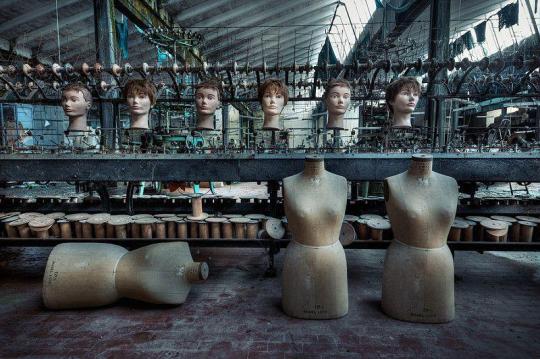
A person’s decision to wear makeup, not wear makeup, or augment their body is their business, because those are decisions they make for their own personal survival. Do not blame them for wanting to survive. Consider the bombardment of messages we hear daily about “worth”. What our bodies look like determine too much to be listed here, but for many, it’s the difference between life and death, even if that’s not an immediately conscious motivation.
Marinate in that.
So let’s get down to the series conclusion. This is an exciting, though brief, one for me:
Performance and Makeup
When my friend Aepril (from blog #1) messaged me about her dilemma of being asked to show her “real” face, we both connected over the uniqueness of the application of makeup as performers. For a performer, makeup goes beyond wearing a nice face out in the world while we conduct our business. Makeup becomes a ritual act, and a space of channeling energy required to suspend disbelief and transport an audience to other times, realms and worlds.
Makeup for performers is also practical: don’t get drowned out by bright stage lights, and accentuate features so that the audience can follow your expressions while you’re telling a story.
One of my favorite parts of performing is, honestly, the pre-show ritual. I love the act of transformation. I go from my blank little pasty potato face and limp baby hair to creatures and characters from my dreams. I can be:
Super femme
Super butch
Superhero
Child
Old man/woman
Dragon
Cat
Spy
Femme fatale
Ballerina
Goddess
Bird
Elemental
Victorian socialite
Bum
Cartoon character
Someone’s dad
Heartthrob
Potted plant
And the list goes on…
Important note: I recognize that my age, whiteness, and stature grant me certain privileges of transformation that not all are afforded. I think this is important to acknowledge, as well as participate in conversations around greater equity in the entertainment industry. Except in cases such as blackface or cultural appropriation, it’s important to challenge type casting and beliefs around the limitations of who can play certain roles.
Makeup allows me to embody the energy I want to convey. If I can look like it, I can believe it. Sit backstage and watch performers after they’ve put on their makeup and costumes. Often, it’s as if their “normal” personality has left the building, and they begin taking on traits and mannerisms of the character they’re playing. It’s a wild experimentation in the realm of the human psyche- peering into our layers and depths of possibilities and dormant desires and aspects of ourselves. Some performers will reference a character they play and say, “yeah, that’s not who I am. But understanding that character gave me greater compassion for people like that”, while others will tell you that their character is a portrayal of their truest selves.
Because of the perceived separation from reality (though art imitates life), the stage is often the safest place for artists to fully show themselves. There is always the option to retreat afterwards and say “oh no, that wasn’t me. It was all pretend.” Or conversely, moments on stage can empower the artist to be supported in their moment of authenticity, because the audience understands that their role is to respectfully hold space and witness. I find that audiences are far better at allowing for differences when the context of being confronted by them is in an environment separate from their daily lives.
Plainly said-- everyone loves a loose cannon or bold personna on stage or in the movies. They feel far more threatened by it in the workplace or in their beds.
I’m neither advocating for, nor dismissing acceptance of all personality types. But I also sometimes find myself in a producer/manager stress space of saying, “yes, I get that this is wicked cute on stage or in the movies, BUT THIS IS REAL LIFE AND COULD YOU PLEASE ANSWER YOUR EMAILS AND NOT STORE THE KNIVES WITH THE HAIR BRUSHES, THANKS.”
The stage is a place where your desire to give everyone the finger and store the knives with the hair brushes is totally okay. And I think it’s great to have that outlet.
Pro tip: it’s smart to carry bandaids on a film set or backstage at a show.
Makeup gives us the courage to let those pieces out. Sam, looking like Sam, won’t do a lot of stuff. Sam looking like a person, animal or entity she admires (or loathes), will do almost anything. Yes, you can have a field day digging into that psychology, but the fact remains nonetheless.
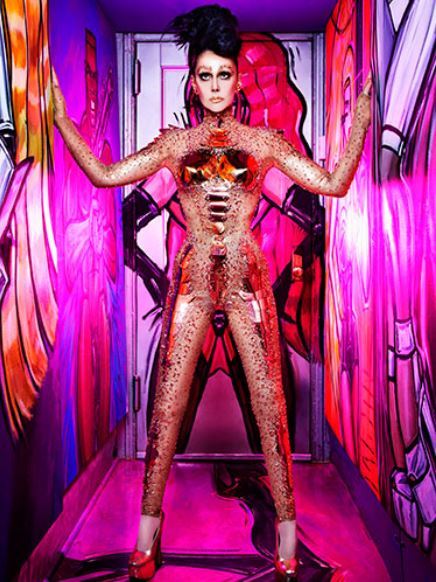
A couple weeks back, beloved Boston burlesque Monster Queen and icon, Devilicia, recommended that I watch “Susanne Bartsch: On Top”, a documentary on Netflix. If you don’t know who this is (I didn’t), here’s an excerpt from her biography on her site:
Susanne Bartsch is New York City’s patron saint of transformation and inclusion. The parties she’s thrown for three decades—from Paris to Tokyo—have provided a venue for countless creative souls and “creatures” to express themselves, come together and forget the hum-drum of the everyday. As Michael Schulman wrote in his 2013 New York Times profile, Susanne’s “empire” continues to flourish “particularly among scene seekers too green to know her history. Wherever Ms. Bartsch goes, the demimonde seems to follow, as if summoned by the bat of her curlicued fake eyelashes.” Fashion mogul John Badum once referred to Susanne as “Mother Teresa in a glitter G-string.”
I can’t recommend this film highly enough. One of the most important parts was when Susanne tells the interviewers that she never had any artistic talent for painting or any other such creative mediums. She instead decided to use her body as her canvas for expression, exploring what makeup, color, texture, and so on could create, and that relation to the world around her. She refers back to the restriction of her upbringing, and how that influences her openness and dedication to personal expression. Susanne influenced countless careers and communities, especially for LGBTQA+ folx and those who consider themselves to be “outsiders”. When people who attend Susanne’s legendary parties were interviewed, many of them speak of these communities as life saving. It was a place where they could just be themselves, and finally be around others who either understood them, or allowed them to be exactly who they are. All of this through the power and creativity of makeup and fashion.
Makeup serves infinite purposes-- safety, transformation, personal exploration, etc. But one thing I love about this craft is its ability to amplify visibility as a sort of flag for finding your people. Often when I’m in a new city, I find myself dressing in a way that will signal to others who might share similar lifestyles that I’m out and available for connection. When I’m at my incognito cafe job and a womxn with black stiletto nails comes up to the register, I’ll give her a certain acknowledging smile and say “I love your nails”, which really means “I see you, friend.” The same way a lonely gay man will show up to one of Susanne’s events with mirror glitter on his eyelids and a tutu made of eyeballs thinking, “hello, do you see me? I’d love to be a part of this family”, so many of us will walk around the world looking for signs of matching lipstick, hairstyle, eyeliner, and tattoos in hopes that we will find other aliens who might accept and understand us.
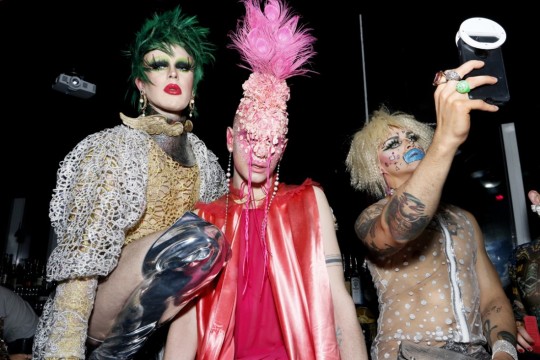
Photo by Cheryl Gorski
Some people find community through the act of not wearing makeup. Yes, I use the word “act” intentionally, because in today’s society, I believe it is a conscious decision to not wear makeup, just as much as it’s a conscious decision to apply makeup. But from personal experience, the people I most often attract when I’m not wearing makeup are not usually “my people”. I give off a very different impression when I wear muted tones, a floppy messy pixie cut, and display my thin, pale, generically-European facial features. When I outwardly express myself through makeup and fashion, it’s like throwing a direct line to the crowds and conversations I want to be having. It’s not a flawless system, of course. Sometimes the same people who love and adore me while I’m dolled up have absolutely no use for me in muggle form, not always realizing that I’m the same person. Sometimes that makes me laugh, sometimes it makes me cry. Depends on the day.
I stand by the belief that your decision to wear or not wear makeup is revolutionary. It is a decision made that acts as agency in how you want your life to be played out. That’s powerful, whether for better or for worse. So many people say “ehhh wearing makeup is conforming” or vice versa. But I’d like to present the challenge that what we do to our own bodies is not the conformity, but rather the conformity lies in the pressure we put on others to think, feel, and present as we do, or in a way that’s convenient and pleasurable to us.
If you did the exercise from the first blog in this series and kept your list of all the reasons why you do and don’t wear makeup, go ahead and look at it now. Reflect on each of those responses, and remember that it’s your fucking life. Our bodies dictate almost all of the experiences we will have in the world. It is your right to try and have as much say in that as possible.
Thank you so much for reading, and best of luck on your journeys of exploration, expression, and finding a home with your people, whoever they may be.
** “women and cis-women” is a term my friend Alexis recently said to me, and I’m playing around with it.
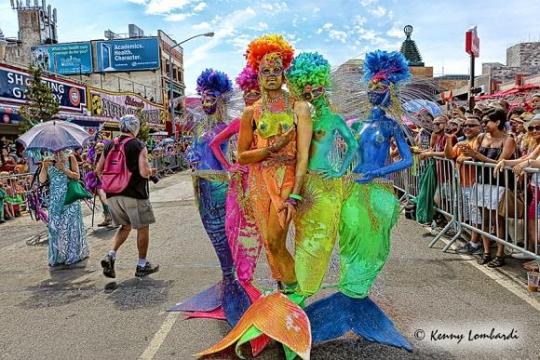
0 notes
Note
If you wanted to create an Earth-3 superhero team: what would be your ideal lineup?
(Brief or oblique mentions of weight, child abuse, and arson deaths.)
In the aftermath of Ultraman’s swift and decisive takeover of Metropolis, star newshound Lois Lane confronts Lex Luthor in his hospital bed, surrounded by medical hardware and the white noise of life support.
“That metahuman he killed, Kaleido,” she says, with a bulldozing momentum she’s perfected over years of practice, too quick and insistent to be interrupted or deflected. “What exactly happened there? How did they” – she had plenty of time to think about how to handle the pronoun on the way over; stick with the indefinite until contradicted – “halt the Ultraman, and what went wrong?”
Lex’s expression, already at the edge of its tolerance, grows abruptly forbidding. He gestures to his bodyguard without a word and immediately she’s at Lois’s side, taking her arm in an implacable grip. Her tone is colored with the cold anger of steel, of stone, of a concrete retaining wall as she says, “This interview is over.”
But this story isn’t, Lois doesn’t say aloud.
She spends way too much time searching financial records and digging through shell companies and public health files, but Lois was the youngest journalist nominated for the Kerth Award in twenty years and there’s nothing that can stop her when she’s on the trail of something big. Finally, just when she’s wondering if her memories of sunlight were nothing more than half-imagined dreams, she strikes gold.
She fast-talks her way past the lobby reception desk and makes it all the way to the top floor of LexCorp HQ before she finds her way barred once again by Lex’s girl Friday. Grace Cooper, 34, is maybe 5’3”, maybe 120 pounds, and has subdued men twice her size with nothing but joint locks, precisely-applied strikes to sensitive areas, and, on one notable occasion, a car door. Ms. Cooper’s lip curls just enough to be visible – the beginnings of a snarl on the lips of Lex’s pet pit bull. “This area is restricted to employees and invited guests.”
Lois gives her the kind of look reserved for menials who aren’t important enough for above-the-stairs gossip. “Lex is going to want to hear this.”
Ms. Cooper makes a show of activating her earpiece. “Mr. Luthor? It’s Lois Lane with something she says you’ll want to hear.” A beat, then she drops her hand to her hip holster and locks eyes with Lois. “Sorry, Ms. Lane. He’s busy.”
Lois pulls her own phone out of her purse and dials the reception desk. “Hi, Lois Lane of the Daily Planet. I’d like to speak to Mr. Luthor about allegations regarding the death of Nina Hu and the exploitation of minors by the Metropolis School for the Gifted.” A moment later, she hangs up and smiles graciously. “Apparently he can spare ten minutes.”
If Lex ever gives Ms. Cooper permission to get her out of his shiny pate, Lois is going to be in serious trouble.
He closes down whatever he’s working on and steeples his fingers as Lois pushes open the door to his office (apparently Ms. Cooper’s services stop at holding doors when she wants to bury you thirty feet deep in Metropolis Bay). He’s still moving gingerly, but a week out of the hospital and staples holding three ribs together have him off a ventilator, so that’s comforting. His expression is calm with a hint of irritation as he says, “Ms. Lane. Please sit down.”
It says something about Lois Lane that being invited to sit in a set of chairs she knows from experience are the kind of comfortable you can only get when money doesn’t matter to you anymore is the deciding reason for her to stride up to Lex’s frankly enormous desk, slap a file folder down on top of it, flip it open, and stand over him while she speaks. (Not the only reason. She deserves the simple pleasure of looming over him for a change.) “Nina Hu,” she taps the page in front of her, “was taken into state custody at four years old when both her parents were involuntarily and indefinitely committed to a mental institution following crippling psychotic breaks. The only public record of her after that was of her admission and subsequent graduation from the Metropolis School for the Gifted.” She turns to the next page. “Claire Selton’s father pled guilty to first-degree arson and insurance fraud and was sentenced to eight years, but was then granted probation after nine months. Claire herself was taken into state custody due to her mother’s death; admitted to and graduated from the Metropolis School for the Gifted. Victor Cortney’s situation was similar, except that both his parents survived with only severe burns and were unable to take care of him. Aaron Walker was arrested at age eleven for assaults on his parents that hospitalised them both. He claimed that they were abusive, but there were no physical signs of abuse. Despite the severity of the assaults, he was let off with six months probation, then admitted to the Metropolis School for the Gifted. Jacqueline Pike’s family sued Daggett Industries for severe physiological side effects from one of their products. Although by all accounts she seemed to be in perfect health, Daggett offered a major settlement. Now she’d be a sophomore at, you guessed it, Metropolis School for the Gifted.”
Lois turns to the last page. “Patricia Edwards. She’s the only one here who hasn’t got any history with the legal system, but she got some publicity when her kinetic sculptures were put on display at the Metropolis Museum of Art when she was only fifteen. Two years later, a girl of her height, build, and distinctive hair colour showed up in a photo of a passenger train that malfunctioned and should have crashed, but inexplicably didn’t. I wouldn’t have known anything was amiss if I weren’t already looking for anomalous events associated with students at the School for the Gifted. Apparently she’s been interning with LexCorp since she was sixteen.” Lois plants both her hands on the desk and leans forward. “Tell me, Lex. Is that in the same capacity you hired Nina Hu?”
Lex’s steepled fingers are pressed to his lips; his frown has been deepening since Lois started speaking. Now he lowers his hands and says, in the most forbidding tone she’s heard from him yet – and she’s heard some forbidding tones from him – “If you expose these children for the sake of your petty search for a scoop, Ms. Lane, know that I will stop at nothing to make sure you never work as a journalist again.”
Lois actually gets a chill down her spine. Lex plays the game as well as anyone else, but he’s always been a puppy dog at heart. He’ll do almost anything to facilitate what he thinks is best for everyone, block any obstacle he thinks will get in his way – saving the world, he calls it – but he’s never dared to directly threaten a free press before. She ignores her inconvenient perturbation and presses onward. “That’s exactly it, Lex. Children. There are laws about that. And if you’re using them as soldiers against superpowered beings—”
“I do everything in my power to protect them.” Lex takes a deep breath, winces in pain, and leans back in his chair, closing his eyes for a moment before continuing. “There are superpowered beings all around us, Ms. Lane. These children grow up exposed to a daily barrage of the atrocities they commit. The Metropolis School for the Gifted takes in those who might otherwise be targeted for recruitment or assassination by people like Superwoman or Power Ring, and studies their abilities so they can train them to use those abilities safely. Without that training, Nina Hu would have been doomed to witness everyone around her descend into insanity, but by the time of her death she learned to control her telepathy well enough to affect only those she wanted to affect, in only the manner she wished to affect them, and only temporarily. Claire Selton and Victor Cortney would have been a danger not only to those around them but to themselves. Even Aaron Walker would have become a victim of a racist carceral system, only ever seen as a thug, and would likely have been forced into crime for a lack of other options. We protected these children, Ms. Lane, and taught them that they could be powerful, they could choose a life for themselves not defined by destruction.” Lex cracks a bitter smile. “It was inevitable that some of them would want to give back. When push comes to shove, even those not otherwise inclined find themselves unable not to act.” His gaze falls briefly on the photo of Patricia Edwards, then returns to Lois. “By directing their activities, training them in combat and crowd control, teaching them teamwork and establishing strict protocols to maintain everyone’s safety, I keep them from going off on their own vigilante crusades. It is this and their anonymity that keeps them alive, Ms. Lane, and if you compromise that, I will not hesitate to destroy you.”
Lois realises that her mouth is hanging open. She closes it. Before she can think of response, Lex closes his eyes again and says, “I’m afraid your ten minutes are up.” Without looking, he presses an intercom button underneath his desk. “Ms. Cooper, if you will please escort Ms. Lane out of the building, I believe my 1:00 appointment will be arriving soon.” He releases the intercom and meets Lois’s eyes once more as Ms. Cooper strides into the office. “I’m glad we had this discussion, Ms. Lane. Do not bother me with this matter again.”
#justice league#crisis on two earths#earth 3#lex luthor#lois lane#mercy graves#royal flush gang#volcana#a version of this scene may or may not make it into my lex luthor vs. ultraman fic wip#hopefully it will#the metropolis school for the gifted is a combined mirror version of project cadmus and the center for paranormal studies in STAS#let it be known that i did not make the x-men connection until long after i decided to have ultraman fracture lex's spine#he's charles xavier now i guess. sorry
25 notes
·
View notes